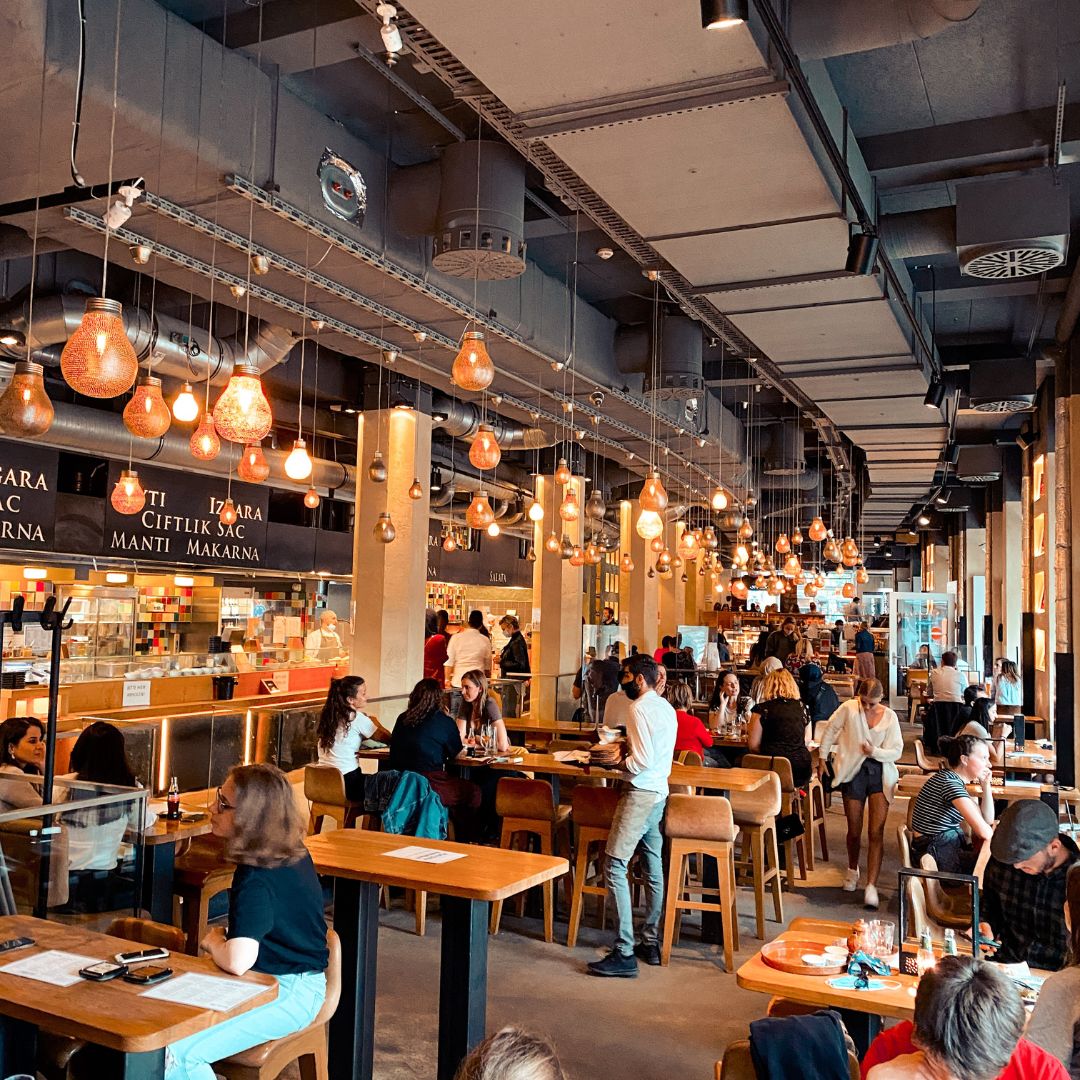With constant changes in online behaviour and the emergence of new platforms, it can be tough to keep on top of the latest marketing trends.
To help you get ahead of the curve, our team has put together this guide on some of the biggest marketing challenges facing hospitality brands in 2023 – and shared our solutions on how to overcome them.
Challenge #1: Creating enough high-quality content to populate your marketing channels
The volume of content required to succeed on social media today is much higher than it was even a year ago. The rise and rise of short form video – which shows no signs of slowing down – has contributed to this and many brands have been left on the back foot, scrambling to gather enough videography and photography to keep up.
If this sounds like you, you’re not alone. Finding the time and resource to create and source content is without a doubt one of the most common challenges hospitality brands come to us with.
One of the ways we have successfully solved this problem for our clients is by working closely and collaboratively with their teams on the ground across sites to help capture suitable content. We provide in-depth brand visual guides and communicate regular briefs in the form of prompts, ideas or visual examples communicated with the teams through group chats on WhatsApp or Slack. When we receive the content, our team then edit it into suitable formats to be shared through the client’s marketing channels.
As well as collaborating with teams in this way, we also; source and edit user-generated content; repurpose existing content into new formats; brief photographers and videographers to create social-first content; manage in-house creative residencies and weave original content as a deliverable into our contracts when working with influencers (something we will cover later in this article).
By taking a multi-pronged approach to content marketing this way, you can ensure all bases are covered for your brand.
Challenge #2: Getting on TikTok – and getting it right
We have spoken in the past about the slow uptake the hotel and hospitality industry seems to have when it comes to making its mark on TikTok. In 2023, hospitality brands who don’t invest in their TikTok presence will get left behind as the shift to short-form video will see this platform dominate the world of social media.
As well as the huge potential for organic growth, the platform is growing rapidly as a search and advertising channel. Treating TikTok like an add-on or an afterthought – when it should now be at the centre of your social media marketing strategy – is a costly mistake to make as we move into 2023.
Another mistake is approaching TikTok with the same strategy as your other social channels – we see too many brands try to grow their presence on TikTok by replicating their approach from Instagram which just isn’t effective.
So how do you get it right? If you’re struggling with integrating TikTok into your digital marketing strategy (and we know a lot of hospitality brands are) we’ve put together an ultimate guide on how to use TikTok effectively here.
This guide tells you everything you need to know about the app including our top tips for creating content that works on TikTok, how you can effectively advertise on the platform and more.
And if you need another reason as to why you should be on TikTok…
Challenge #3: Getting ahead of changing search behaviours
Will “I’ll Google it” soon become “I’ll TikTok it”? Well, according to Google themselves, it’s a possibility as a huge shift is taking place in search behaviours – especially among younger generations.
In fact, Google studies show that 40% of Gen Z prefer to search on TikTok or Instagram over Google Search – a number that is only set to grow as we move into 2023.
Senior VP Prabhakar Raghavan, who runs Google’s Knowledge & Information organisation, said: “We keep learning, again and again, that new internet users don’t have the expectations and the mindset that we have become accustomed to… when they’re looking for a place for lunch, they don’t go to Google Maps or Search. They go to TikTok or Instagram.”
As social media channels grow into powerful search engines, your presence and activity on these platforms has never been more important. Besides offering entertainment and inspiration, TikTok and Instagram are educational channels that will be leveraged by your future guests and members to scope out the best places to stay, work, eat and socialise.
We recommend creating value-based social media content around the questions you know your audience will want answers to. If you can do this in a more organic way through influencer partnerships or lo-fi content, even better. Examples could include a TikTok tour of your space led by an onsite team member, an Instagram Reel showing the best lunch spots near your coworking space or an Instagram carousel posts on the benefits of coliving over regular renting.
Challenge #4: Maintaining authenticity in your advertising
One challenge that many hospitality brands face is maintaining a level of authenticity in their ads – especially ads on social media. While paid social ads are one of the best ways to grow brand awareness and drive bookings, you also need to ensure that your ads are providing the audience with a good experience.
As it stands, many social media users find ads overwhelming, repetitive, and irrelevant – in a survey conducted by CMO, 44% found the ads they were seeing irrelevant.
The key to bucking this trend is creating ads that don’t feel like ads. Yep, you heard right – the content in your ads should look and feel like the content that your target audiences want to see in their newsfeeds, whether that’s on Instagram, TikTok or Facebook.
Here are some quick tips on how you can achieve this:
- Tailor the content to different audiences – segmenting your audience is best practice across all your marketing (and something we will mention more than once in this article) but it’s even more vital when it comes to your ads. You have a whole host of targeting tools at your disposal, but it’s important to make sure your content and copy is tailored so that it’s relevant, timely and interesting to each audience.
- Sell sensibly – while sharing special offers and sales to retargeted audiences is great for driving bookings, you want to avoid sharing similar messaging with cold audiences as this will put potential guests off. Instead, try to offer something aspirational or of value in your brand awareness ads – we promise you will see much better results in terms of audience growth and engagement.
- Use influencer content in your ads – using influencer videos in your ads is a great way to maintain that authentic vibe that feels native to your audience’s social media feeds. When laying out your influencer partnership, you can either ask them to shoot and edit a video to be used in an ad or ask for the raw video footage for your team – or your marketing agency – to then edit together.
- Understand what works – keeping a close eye on the performance of your campaigns is essential if you want to make sure they are successful. Our approach is to experiment with many different formats and creative, then use data to find the winning formula for our clients before scaling campaigns up to drive bookings.
At Stay The Night, we have found that the more ads imitate organic content, the more audiences tend to engage with them and take the actions we want them to take. If the ad creative is informative, entertaining, and/or inspiring, social media users will naturally respond. If you need help with your ads, be sure to get in touch to see how we can help.
Challenge #5: Optimising influencer partnerships to maximise ROI
One of the biggest challenges for hospitality brands in 2023 will be to maximise the return on investment (ROI) from influencer partnerships. This is an ongoing challenge as many hospitality brands we speak with struggle to get the most out of their influencer marketing.
Influencers can bring a lot of brand recognition and loyalty – 61% of consumers trust influencer recommendations, compared to 38% who trust brand-produced content. At the same time, consumers have become savvy to how influencer-brand partnerships work and will quickly catch on to inauthenticity in influencer reviews.
So, what’s the best practice for influencer marketing in 2023? At Stay the Night, we’ve found that the best approach is to invest in long-term partnerships with influencers who then become brand ambassadors.
These long-term partnerships allow your brand to tap into existing online communities in a way that feels more organic and less salesy – which is the type of content social media users want to see. It also helps the influencer themselves to build trust with their audience, so it’s a win-win for both parties.
Another way to maximise ROI from your influencer partnerships is to leverage these partnerships to create valuable, high-quality content to use in your marketing. This is something we include in all our influencer contracts and you should too. Our coliving and hotel clients have also had success with in-house creator residencies – where they host a creator for a longer period of time in exchange for ongoing content.
Challenge #6: Creating communities and conversations
2023 is the year to move away from one-way marketing messaging towards two-way communications which are the best way to build trust and loyalty with your customers. Today’s online audiences don’t want to see brands talking endlessly about themselves – instead, they are seeking out brands with real personalities that share dynamic, entertaining and hyper-personalised content.
If your brand is struggling to focus on building relationships with your online audiences, you’re certainly not alone as this is a challenge we see come up time and time again.
This is where a focus on your organic social media strategy can really set you apart from your competitors. These channels are where your brand voice comes to life and they can provide a forum for that two-way dialogue to take place. You can prompt this through creative content including interactive videos and graphics, polls and quizzes and Q&As.
As well as considering how the content you put out drives conversation, at Stay the Night we also have dedicated Community Managers who oversee and encourage these two-way dialogues between our clients’ brand accounts and their audiences.
Email is another channel where you can focus your community building efforts by sharing exclusive content and offers with your email list. With this channel, it’s all about personalising – segment your audience into focused groups and then serve them with content and deals that are hyper-relevant to them.
Challenge #7: Reflecting what you offer in a balanced way
Post-pandemic, we’ve seen the wide-scale adoption of the hybrid model across the hospitality industry with the lines between hotels, hostels, coliving and coworking spaces continuing to blur at a rapid rate. But for many hospitality brands, diversifying their offering can bring another challenge – how to balance their marketing and content strategies across the many different aspects of their business.
While the core marketing objectives of driving revenue and bookings remain the same, marketing a hybrid hospitality brand requires a different strategic approach to that of marketing a traditional hotel or hostel.
Here are three of our best practice tips:
- Use data and research to find the common threads that unite your customers – when you go beyond demographics to consider your customer’s interests, goals and motivations you will find shared mindsets and values that you can craft your content around
- Personalise your marketing to each target audience using segmentation – we’re talking everything from separate ads funnels to targeted landing pages, segmented email lists and even engaging with different types of influencers to appeal to different audiences. Do this and we guarantee you will see your marketing ROI increase as a result.
- Analyse the user flow of your hybrid hospitality brands’ website – which you can do via Google Analytics – is particularly useful as it helps you gain insight into demand levels for each segment by showing where users are landing on your website and the paths they take from the source through to where they exit the site. When clients work with us, they get access to a personalised URL where the data from their website as well as each of their marketing channels is tracked in real-time which ensures that we are always making data-lead decisions.
For a more detailed breakdown of marketing a hybrid hotel, you can find our guide with 6 best practice examples here.
Curious about the hybrid hospitality model more generally? We’ve got you covered with our latest whitepaper – Hybrid Hospitality Unpacked: From Concept to Community Building’ – which features interviews with six industry leaders in this ever-changing space. You can download your copy here.
Challenge #8: Marketing through uncertainty
The unfolding cost of living crisis, Russia’s ongoing war with Ukraine and a potential recession on the horizon – it’s safe to say the beginning of 2023 brings with it a great deal of uncertainty.
While the temptation can be to cut marketing spend during these difficult times, history has demonstrated time and time again that turbulent periods can provide incredible opportunities for business growth when brands sustain or even increase their marketing activities. As the saying goes ‘when times are good, you should advertise; when times are bad, you must advertise”.
For hospitality brands that are already emerging from an incredibly difficult period, it is vital that every penny of marketing budget is optimised to ensure maximum returns. We have found that the key to this is implementing the right strategies at the right time, adopting a flexible and responsive approach to your marketing, and tracking data in real-time – monthly reports are not enough to ensure results.
We know from experience that online brand and community building underpinned by performance marketing – and coupled, of course, with an outstanding onsite experience – is how you drive bookings and keep your customers returning to your restaurant again and again. As we saw during the pandemic, the hospitality brands that that leverage customer loyalty through brand communities will prove the most resilient as we move into 2023.
Challenge #9: Being responsive to customer service demand on marketing channels
Thanks to the always-on nature of social media, customers now expect prompt and personalised support from brands via their social channels – and this only looks set to continue.
In 2023, social media users will expect a response time of just hours – with 45% saying they will switch brands if a company doesn’t promptly address their needs. To avoid losing valuable bookings, hospitality brands must be prepared to invest in customer communications support, ensuring an efficient system is in place for monitoring and responding to their customer’s enquiries.
At Stay the Night, we make sure our clients are always responsive through the work of our dedicated Community Managers who are on hand to respond quickly and appropriately to social media comments and DMs.
Looking for support to get ahead of these trends and challenges? Get in touch to find out how our team can support you in 2023 and beyond… Drop us an email to hello@staythenight.net.



